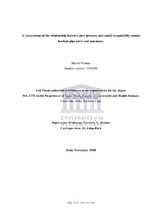| dc.description.abstract | Hookah-pipe smoking escalated from being a cultural phenomenon to being a social phenomenon. Studies suggest that the hookah-pipe is a high-risk phenomenon which has become a highly acceptable social practice influenced by social factors such as smoking initiations among peers. What is unknown is whether peer pressure and social acceptance have an influence on the use of the hookah-pipe. The aim of this study is therefore to compare the relationship between peer pressure and social acceptance among adolescent hookah-pipe users and non-users. The objectives of the study are to determine the prevalence of peer pressure, social acceptability and smoking tobacco using the hookah-pipe among adolescents; establish the relationship between peer pressure and social acceptability of adolescent hookah-pipe users and non-users and to compare the relationship between peer pressure and social acceptability among adolescent hookah-pipe users and non-users. A cross-sectional comparative correlation study was conducted with a sample of Grade 9 adolescents attending secondary schools in the Metro East Education District in Cape Town. Structured questionnaires constructed from the NationalASH 10 Year Snapshot Survey, the 10-year in-depth survey, the health and lifestyle survey and peer pressure, as well as an NICHD Study of Early Child Care and Youth Development questionnaire were completed by the participants. The Statistical Package for the Social Science (SPSS) software was used to analyse the data. The results show that no relationship was found between peer pressure and social acceptance, but a relationship was found between parental rules and monitoring around tobacco use for hookah-pipe users. A significant difference was also found in the attitudes towards hookah use between users and non-users. The ethics for this study included voluntary participation, informed consent and anonymity. | en_US |

